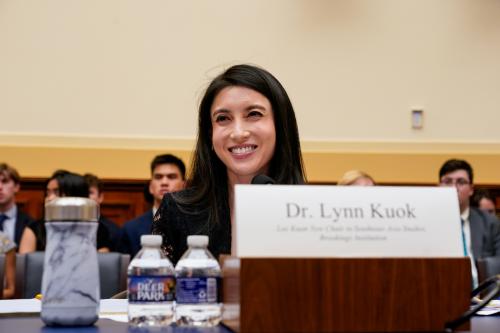Russia and China have been sending very mixed signals to the international community lately. On the one hand, both have been assertive—at times outright aggressive—in their respective regions. On the other, they’ve been more cooperative on global issues like countering the Islamic State (or ISIS), climate change, and nuclear proliferation. What does this mean for international order? And how should the United States respond?
For many analysts, the world is a pyramid in which the global naturally sits on top—that is, the global issues trump the regional. And the more dangerous global threats become, by that logic, the more important it is to cooperate with Russia and China.
But the opposite is closer to the truth. The foundation of global order is not institutions like the United Nations and the International Monetary Fund, important as they are. It is healthy regional orders in areas of vital strategic importance.
Sleight of hand
In the larger strategic debate, it is often said that Russia and China do not pose a challenge to the global order because they lack an alternative vision for what would replace the United Nations, the IMF, and the World Bank. The logic is that we remain on track for a cooperative international order organized around common challenges. There will be differences, but they can be compartmentalized and managed.
However, as my colleague Martin Indyk has pointed out, China and Russia are deliberately seeking to use their cooperation on global issues to blunt the response to their regional ambitions. This is not new: During World War II, the Soviet Union—in negotiations with Washington on the post-war order—played hard-to-get on the United Nations. Its aim was to make the United States more compliant on accepting Soviet domination of Eastern Europe.
The strategy is back, and we can expect it to be used more and more. China, for one, will almost certainly send the message that pushing back against its activities in the South China Sea could poison the atmosphere on global issues that the United States really cares about. Russia could demand a relaxation of sanctions or Western pressure on Ukraine in exchange for cooperation on Syria.
Building blocks
The real question here is which is more important for the future of the liberal order—the regional or the global. In fact, global order is founded not on the U.N. or the international financial institutions, important as they are but on healthy regional orders. It was the U.S.-led order in Europe and North East Asia—through democratization, NATO and later the EU, as well as the U.S.-Japan alliance—that created zones of peace that largely hold today. And it was the bilateral hub-and-spoke alliance system, along with democratization, that accomplished much the same in East Asia.
If those regional orders fall apart, so will the global order. A war between China and Japan, the world’s second and third largest economies, for example, would have massive repercussions for the global economy. A Russian incursion into the Baltics would raise the risk of nuclear war between the world’s two largest nuclear powers.
If those regional orders fall apart, so will the global order.
It is for this reason that Russian and Chinese activities in their neighborhood are more indicative of their approach to the international order than their explicit policy on global issues, although those are also important. Ultimately, honoring the norm against territorial conquest is a much more important than abiding by the dispute settlement mechanism of the World Trade Organization.
It should come as no surprise that China and Russia are regionally-focused—after all, major powers are usually primarily concerned about their immediate environment rather than abstract notions of global leadership. In the years to come, we should expect that their core challenge to the liberal world order will be in their immediate neighborhoods.
Focus on the spheres
The ultimate goal of states like China and Russia is to remake their respective regional orders. China seeks power parity with the United States in East Asia and a sphere of influence in the western part of the western Pacific. Russia’s eventual goal is a great power concert in Europe and a sphere of influence within the territory of the former Soviet Union. If they succeed, and they probably won’t if the United States and its allies push back, the liberal world order will be transformed back into a spheres of influence system that is much less liberal and democratic than the present order.
In this sense, the future of the liberal order will be determined by what happens in East Asia and Eastern Europe. That’s not to suggest that the United States should not seek to work with Russia and China on common challenges. But it is to say that issues of regional order shouldn’t go unnoticed. To the contrary, they should remain the top priority of the U.S. government.
The Brookings Institution is committed to quality, independence, and impact.
We are supported by a diverse array of funders. In line with our values and policies, each Brookings publication represents the sole views of its author(s).




Commentary
Think globally, act regionally: The importance of the regional for global order
November 23, 2015